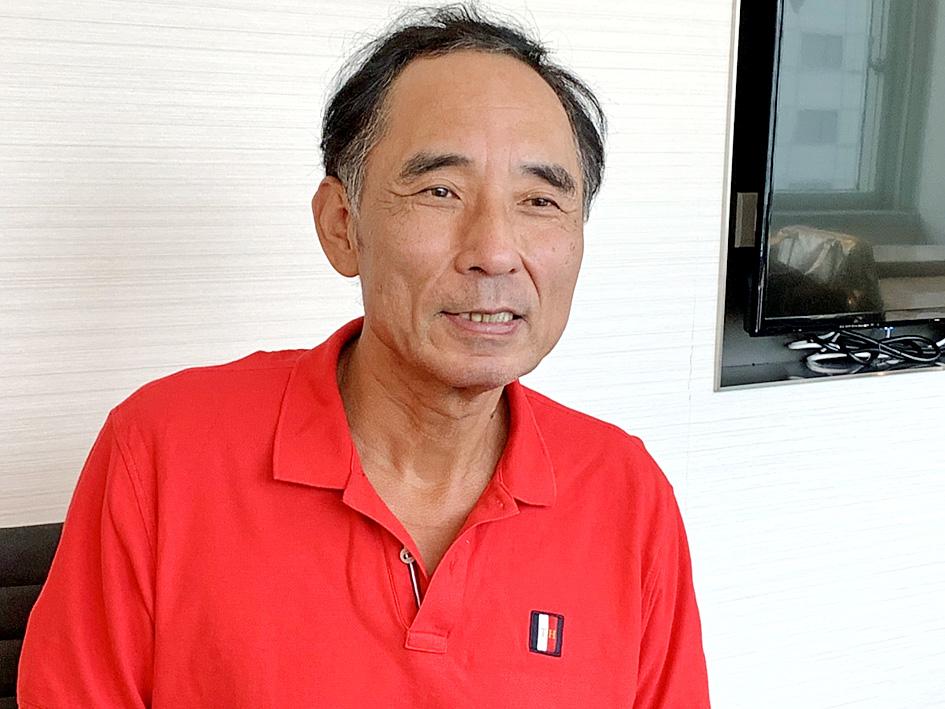Former Nanya Technology Corp (南亞科技) president Charles Kau (高啟全) has teamed up with Taiwanese semiconductor equipment maker Scientech Corp (辛耘) to invest in LVG Semiconductor (Huangshi) Co Ltd (祿億半導體) in China to provide wafer reclamation services there.
In a rare appearance in Taipei yesterday, Kau confirmed a report by the Chinese-language Liberty Times (the Taipei Times’ sister newspaper) that he is back after leaving China’s Tsinghua Unigroup Ltd (清華紫光) on Wednesday last week.
During the five-year period with the Chinese group, Kau helped Yangtze Memory Technology Corp (長江存儲), a memory manufacturing arm of Tsinghua Unigroup, develop and produce China’s first 3D NAND flash memory chips.

Photo: Hung Yu-fang, Taipei Times
LVG Semiconductor was founded in Huangshi City, Hubei Province, last year with an initial capital of US$29 million, the Liberty Times reported. The company has not formally started operations yet.
“Market demand is very strong in China, but there is a lack of reclaimed wafer suppliers there,” Kau said.
It is more cost-effective to provide reclaimed wafers from Chinese factories rather than importing them from Taiwan, as the logistics would add US$6 to the overall cost of every reclaimed wafer, he said.
LVG Semiconductor is building its first plant in Huangshi, which is to start operating in the second half of next year, he said.
It would recycle used 12-inch wafers by separating precious metal wires and chemicals to ensure they are not contaminated.
Kau denied that Chinese and foreign funds are involved in LVG Semiconductor.
The company’s shareholders and board directors are all from Taiwan, he said, adding that neither the Chinese government nor global investors have injected capital into the firm.
Kau said he is only an investor in LVG Semiconductor and holds a seat on the company’s board.
Scientech would be in charge of the new company’s operations, he said.
Kau added that he is scouting for other investment targets.
Scientech is a supplier of reclaimed wafers and semiconductor equipment with annual revenue of NT$3.95 billion (US$136.4 million) last year.

TRADE WAR: Tariffs should also apply to any goods that pass through the new Beijing-funded port in Chancay, Peru, an adviser to US president-elect Donald Trump said A veteran adviser to US president-elect Donald Trump is proposing that the 60 percent tariffs that Trump vowed to impose on Chinese goods also apply to goods from any country that pass through a new port that Beijing has built in Peru. The duties should apply to goods from China or countries in South America that pass through the new deep-water port Chancay, a town 60km north of Lima, said Mauricio Claver-Carone, an adviser to the Trump transition team who served as senior director for the western hemisphere on the White House National Security Council in his first administration. “Any product going

STRUGGLING BUSINESS: South Korea’s biggest company and semiconductor manufacturer’s buyback fuels concerns that it could be missing out on the AI boom Samsung Electronics Co plans to buy back about 10 trillion won (US$7.2 billion) of its own stock over the next year, putting in motion one of the larger shareholder return programs in its history. South Korea’s biggest company would repurchase the stock in stages over the coming 12 months, it said in a regulatory filing on Friday. As a first step, it would buy back about 3 trillion won of paper starting today up until February next year, all of which it would cancel. The board would deliberate on how best to effect the remaining 7 trillion won of buybacks. The move

China’s Huawei Technologies Co (華為) plans to start mass-producing its most advanced artificial intelligence (AI) chip in the first quarter of next year, even as it struggles to make enough chips due to US restrictions, two people familiar with the matter said. The telecoms conglomerate has sent samples of the Ascend 910C — its newest chip, meant to rival those made by US chipmaker Nvidia Corp — to some technology firms and started taking orders, the sources told Reuters. The 910C is being made by top Chinese contract chipmaker Semiconductor Manufacturing International Corp (SMIC, 中芯) on its N+2 process, but a lack

NVIDIA PLATFORM: Hon Hai’s Mexican facility is to begin production early next year and a Taiwan site is to enter production next month, Nvidia wrote on its blog Hon Hai Precision Industry Co (鴻海精密), the world’s biggest electronics manufacturer, yesterday said it is expanding production capacity of artificial intelligence (AI) servers based on Nvidia Corp’s Blackwell chips in Taiwan, the US and Mexico to cope with rising demand. Hon Hai’s new AI-enabled factories are to use Nvidia’s Omnivores platform to create 3D digital twins to plan and simulate automated production lines at a factory in Hsinchu, the company said in a statement. Nvidia’s Omnivores platform is for developing industrial AI simulation applications and helps bring facilities online faster. Hon Hai’s Mexican facility is to begin production early next year and the